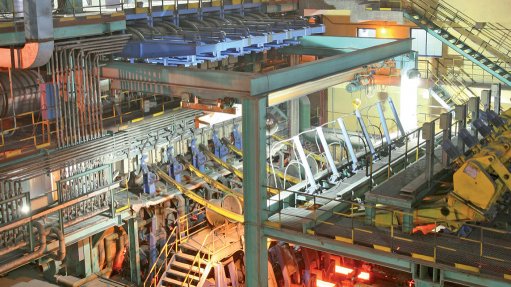
MINI MILLS The mills are especially useful in developing countries because they are less energy intensive and require a much smaller upstart capital investment
Metallurgic processing plant supplier SMS group states that the South African steel industry is embracing mini mill technology as an alternative to expensive traditional integrated steel plants.
SMS group’s latest annual report, published last year, indicates that steel producers are looking to invest in localisation and smaller plants, specifically mini mills, further stating that, to stay competitive in today’s fluctuating steel industry, producers need flexible production concepts, as well as better quality and high-end products.
According to the report, the steel industry is demanding “solutions that directly boost efficiency at a reasonable cost, and in short return-on- investment periods.”
SMS group technical services South Africa MD Pieter Bezuidenhout foresees that mini mill plants will become important role-players in the local steel industry. Mini mills, typically used for the production of long products, are ideally suited to steel industries in developing countries because they are less energy intensive and require a much smaller upstart capital investment, compared with that of traditional integrated steel plants, he explains. Mini mills are also more suitable for developing countries where supplies of coking coal are limited.
The typical feedstock for mini mills is usually scrap metal or a combination of scrap metal and direct reduced iron (DRI), also known as sponge iron. The expenses associated with DRI- and scrap-based steel plants are typically lower than those of integrated steel plants, which manufacture steel from iron-ore.
Further, mini mills provide producers with the liberty of manufacturer mobility. The feedstock for mini mills is significantly lighter and easier to transport, which frees producers from the burden of having to be situated near the source of the raw material.
These mills are small enough to be situated near demand hubs, and producers who use them often to supply a regional client base, thus significantly cut down on final product transportation costs. These plants can also produce high-quality product profitably at lower yearly production volumes, resulting in increased profitability during an economic downswing.
SMS group’s mini mills use ARCCESS steady EAF technology, which are electric-arc furnaces that operate on the principles of submerged-arc furnaces. Bezuidenhout points out that this technology enables SMS group’s mini mills to provide clients with at least a 30% reduction in electrical energy consumption.
“There is a marked increase in interest in Africa for our mini mill technology, such as our compact, efficient and economical technology designed for long product plants between 150 000 t/y and 300 000 t/y,” he notes. SMS group also has its continuous mill technology designed for long product plants between 300 000 t/y and 500 000 t/y.